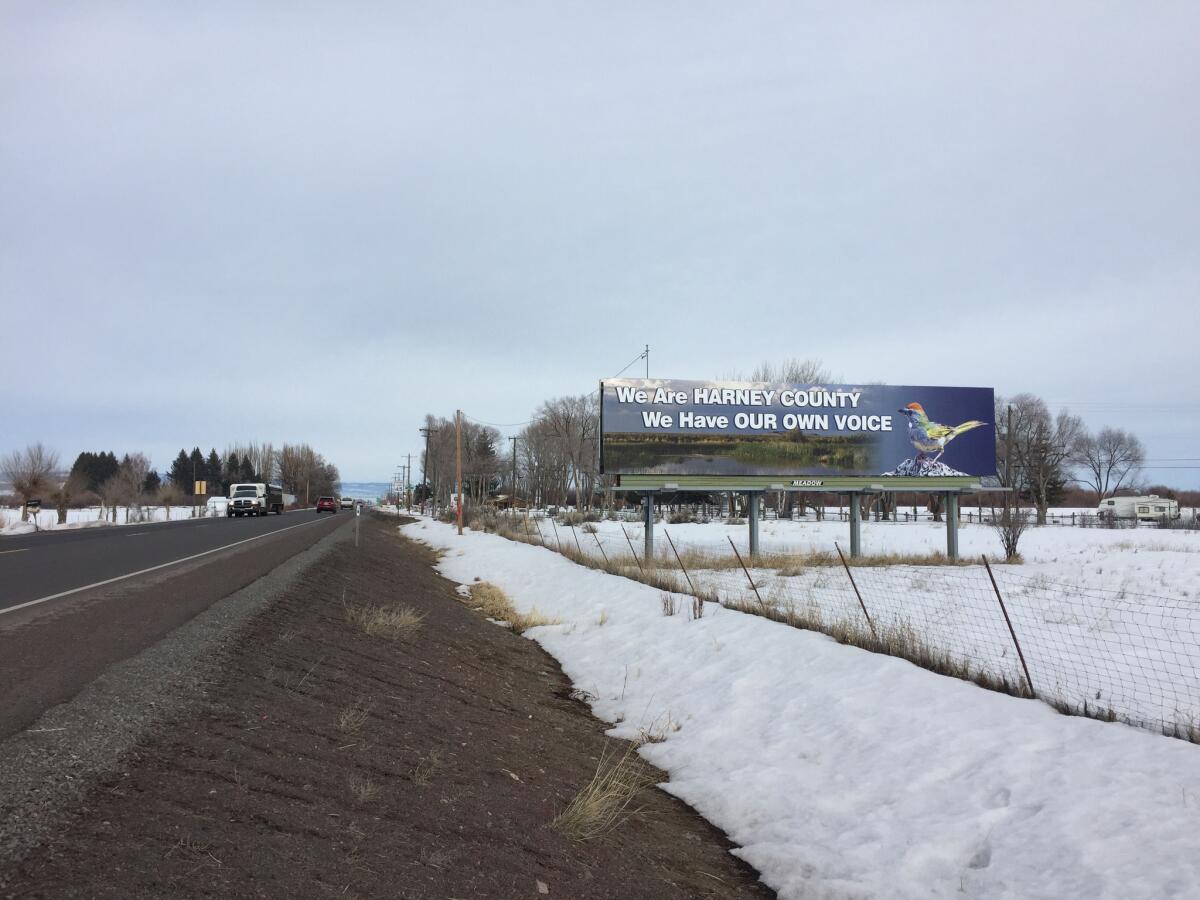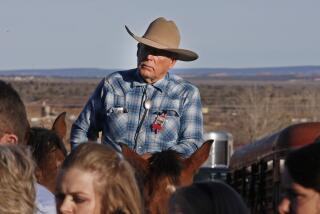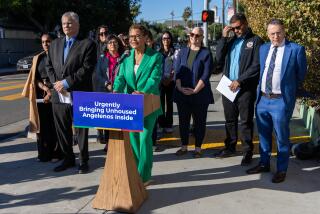The Oregon occupation is over, but standoffs among nearby residents continue

A billboard outside Burns, Ore., the day after an armed standoff ended at the nearby Malheur National Wildlife Refuge.
In the end, the people in the little town of Burns never rose up in revolution against the federal government. They only rose up against one another, in cafes, on Facebook, in their places of worship.
The nearby Malheur National Wildlife Refuge that was the center of a 41-day armed occupation aimed at challenging the power of the federal government was a sprawling crime scene by Friday, occupied by federal agents and a few trucks. The occupiers were in custody; the long-feared shootout never happened.
Instead — apart from the Jan. 26 shooting death of group spokesman Robert “LaVoy” Finicum during a law enforcement highway trap — the protest’s primary casualties are the emotionally wounded residents of conservative Harney County, who had been torn for weeks over whether to support the right-wing occupation.
See more of our top stories on Facebook >>
They now must find a way to end their own standoffs among themselves, here in the desolation of Oregon’s high desert.
“There’s a lot of people who have been here a long time and lost friendships over it,” said Nicole Davis, 45, a third-generation Harney County resident who has stopped going to church because she’s so afraid of getting drawn into a personal fight over the armed occupation.
The men and women who came here from across the country, armed with rifles and pistols, began their protest on Jan. 2, at a moment when the American establishment seemed to be losing its grip. Black Lives Matter protests had shaken cities; Bernie Sanders and Donald Trump had shaken long-standing political parties. Here, the outsiders decided to try to shake the whole federal government.
The outsiders began their protest after two local ranchers were sent to prison under a federal anti-terrorism statute on charges related to burning local federal wild lands. The protesters claimed the desolate bird sanctuary 30 miles outside Burns as their redoubt and said they planned to stay indefinitely.
Some protesters, like Ammon Bundy, said that the federal government had no right to control the West’s public wild lands. They nurtured dreams of a new Sagebrush Rebellion that could take on what they saw as a federal government that had forgotten it was supposed to answer to citizens.
They invited militias to call up their ranks and flock to Oregon, counting on the local populace to get in their cars and join them on the refuge. But the columns of supporters never arrived; some of those who did served more to irritate than mobilize local residents.
Last week, two men came to Linda Gainer’s RV park outside the refuge and said they planned to stay there to help support local ranchers, Gainer recalled Friday while sitting at the counter of her cafe at the park.
She soon found out that the men had posted on Facebook that they were starting a new protest site at her RV park and were calling for supporters to join them. “They lied,” she said.
Things only got worse from there — Gainer had trouble reaching the overwhelmed local sheriff’s office to get help kicking the men out, and then she became a target for abuse from outside the community when word got out on social media that she was supposedly supporting the protesters.
“I started getting crap emails for my business,” Gainer said bitterly, noting that she was also getting angry phone calls, even from California. Residents also seemed baffled by the electronic abuse they got on Facebook — from one another.
M.L. Harris wrote to the Burns Times Herald this week that he had been chastised and exiled on Facebook for having an “open mind” about the protesters and the issues they raised. He said one law enforcement official had challenged him about whether he was “for the militia or for us.”
A local emergency dispatcher and hospital worker had “liked” another user’s comment that called him “crazy,” he said.
NEWSLETTER: Get the day’s top headlines from Times Editor Davan Maharaj >>
“Any opportunity to reason or form worthwhile communication was met with an instant ‘unfriending,’” Harris wrote. “Now, I wonder, if I have an emergency, will I be cared for by a biased dispatcher [or] the person working in the hospital who proclaimed their myopic view by one click of the ‘like’ button?”
Harris wasn’t alone. This week’s letters in the newspaper — published before the final surrenders on Thursday — contain both pleas for the occupiers to leave and statements of agreement with some of the protesters’ issues. The paper seemed to serve as a confessional.
“I was told personally by a very good friend to ‘get off the fence and choose one side or the other,’” one reader wrote. “I felt that I couldn’t do that because I was on both sides.”
But a common criticism seemed to emerge again and again: The occupiers were outsiders who had made a mess in somebody else’s community.
“This is addressed to all the residents of Harney County, with a valid state of Oregon identification with zip codes 97720, 97738, 97904, 97732, 97721, 97722, 97710, 97758,” wrote Burns resident Sue Mackey. “If we do not come together, we are going to lose this county to one of the groups that have invaded us.”
Cathy Jory, a resident of Hines, directed her letter at Nevada rancher Cliven Bundy, Ammon’s father, who had spoken in support of the occupation before he was arrested in Portland on charges connected to his own challenge to the federal government, this one involving cattle grazing fees.
“I am a resident of Harney County,” Jory wrote to Bundy. “I have never given you or anyone else permission to speak, write or act for me.... You don’t represent me. We are all suffering the consequences of the irresponsible actions and words of outside agitators who think they have the right to speak for us.”
Davis, speaking outside the Burns Safeway on Friday, said what so many residents of Harney County seemed to have diagnosed as the key failure of a protest whose viewpoints many local residents shared: “I don’t think that coming into a community from out of state is a good way to make a point.”
The arrests have now brought some relief to the area, though the road outside the refuge was blocked Friday with an electronic highway sign that threatens arrest to trespassers. No protesters could be seen.
“I’m so thankful the whole thing is over with. They walked out instead of being carried out,” said Gainer, who added that she had spent worried nights wondering whether loud noises were gunshots. When she heard news that the final occupier had surrendered, she said, it was “like 300 pounds was lifted off my shoulder.”
At the roadside cafe outside the refuge, waitress Vicky Rogers fetched coffee and eggs for the reporters and FBI agents who had outlasted the occupiers.
Rogers’ best hope for Burns now spoke both to the protesters and the government: “To let us go back and lead our lives” — and, she added, “let us have our Constitution back.”
Follow @mattdpearce on Twitter
ALSO
A crowd of dictators is coming to Southern California
‘Bay Boys’ surfer gang cannot block access to upscale beach, Coastal Commission says
How Killer Mike, Eric Garner’s family and other black leaders will vote on Sanders vs. Clinton
More to Read
Sign up for Essential California
The most important California stories and recommendations in your inbox every morning.
You may occasionally receive promotional content from the Los Angeles Times.











